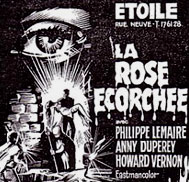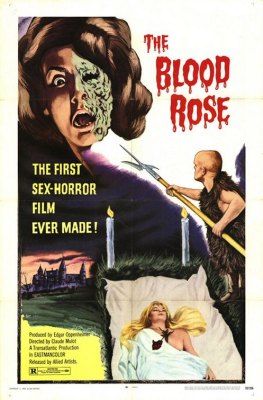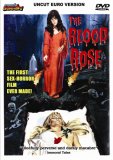| Reviews & Columns |
|
Reviews DVD TV on DVD Blu-ray 4K UHD International DVDs In Theaters Reviews by Studio Video Games Features Collector Series DVDs Easter Egg Database Interviews DVD Talk Radio Feature Articles Columns Anime Talk DVD Savant Horror DVDs The M.O.D. Squad Art House HD Talk Silent DVD
|
DVD Talk Forum |
|
|
| Resources |
|
DVD Price Search Customer Service #'s RCE Info Links |
|
Columns
|
|
|
Blood Rose, The
As famed artist Frederic (Philippe Lemaire) anxiously awaits news of his horribly burned wife, Anne (Anny Duperey, perhaps best known for her sexy dance over the parking garage ventilation system in Pardon mon affaire), flashbacks tell us how they first met. He was dating Moira (Elizabeth Teissier, later French President Francois Mitterand's mistress) but unceremoniously dumps her for Anne, a beautiful brunette who becomes his perfect muse. Moira is left waiting for her wayward lover at a costume party (Frederic was supposed to come as Dracula) but he's already immersed himself in an immensely passionate affair. In no time he's whisked Anne to his decaying, 18th century chateaux.
They set up housekeeping, this despite the presence of two mute midgets, Igor (Roberto) and Olaf (Johnny Cacao, both coincidentally appeared in Jerry Lewis' long-lost The Day the Clown Cried), grubby-faced squatters in crude, furry animal skins allowed to freely roam the grounds through the kind sympathy of Frederic's late father. Though Anne initially is frightened by the motley-looking pair, Frederic improbably makes them servants.
Meanwhile, Anne's beauty inspires a burst of creativity like never before, and the happy lovers prepare a big celebration of their nuptials. However, a bitter Moira shows up and her threatening manner causes Anne to back straight into a raging bonfire. The doctor's verdict isn't optimistic; severe burns have horribly disfigured her face, and she'll never walk again. Soon thereafter, Frederic announces that his wife has died and he and Anne, to say nothing of Igor and Olaf, live hermit-like existences. Until, that is, Frederic learns that one the employees at the strange health institute he co-owns, Professor Romer (Howard Vernon), is in fact a once-acclaimed plastic surgeon, his license revoked after mutilating a child in an operation he never should have attempted. Frederic decides Romer can restore his wife's beauty with a face transplant but for it to succeed the operation will require living tissue.
Alternately impressive and ridiculous, The Blood Rose is all over the map, at times tasteful with a poetry approaching Franju while at other moments closer to the lunacy of Ed Wood. Touted, at least in its thunderously unimaginative American advertising, as "The First Sex-Horror Film Ever Made," its oh-so-French adult sexuality now seems rather tame, with frequent but almost demure nudity (contractually required but its producers, as it turns out), generally limited to an exposed breast here and there. Less tasteful is its depiction of burn victims and midgets as horrible psychopathic monsters.
Poor Igor and Olaf are victims of the worst stereotyping imaginable: horny, murderous midgets who immediately rape and slobber over the women Frederic has kidnapped. And though he makes them his servants, Frederic thinks so little of them he won't even spring to buy them a proper wardrobe. One can't help but wonder watching portrayals like this how depressing an experience it must have been for the actors.
The absence of logical storytelling and sloppy production errors also bring the film down several notches. Though set in the present and despite the presence of electricity in the manor house, everyone walks around with unwieldy candelabras. When one of the kidnap victims goes missing, Igor and Olaf go searching for her carrying one of these heavy things. Why not use a flashlight? Frederic has no better sense than to hire a voluptuous Ann-Margret type (Michele Perello), in a miniskirt uniform no less, to look after his wife, and seems genuinely surprised by her jealous, bitter reaction.
Though one can easily ascribe the over-melodramatic passion of the film's early scenes to its dream-turned-nightmare sensibility, other scenes and dialogue have the screwy logic and over-written qualities of Ed Wood, particularly in a long monologue a police detective (Jacques Seiler) delivers about this crazy computer-driven age we live in. Other elements - such as the cliché dripping blood-red wax font common to cheap horror movies used in the titles, to Anne's inadequate burn make-up, to the weird jump cuts and continuity gaffs - don't help, either.
Conversely, the acting is generally good all-around (even Seiler almost pulls off that strange monologue, goofy in any language), and the delicate, low-key approach to the material nicely contrasts that crass exploitation that was fast becoming the genre's mainstay. (After Anne's accident, for instance, Frederic can no longer paint nudes or people in general, and in a well-done scene struggles to paint a pair of stuffed owls that stare balefully at him.) Cinematographer Roger Fellous' compositions are above average, and Jean-Pierre Dorsay's haunting score is especially good and atypically lush for the genre at this time.
The film's most pleasant surprise is its unusually sympathetic turn for Howard Vernon, the John Carradine of Euro-horror best remembered today for his long if not exactly fruitful association with Jess Franco. His ethically conflicted plastic surgeon/ex-con is a surprisingly rich characterization, and his understated performance at the film's climax sells the unexpected and highly effective denouement.
Video & Audio
The Blood Rose has been given an excellent 16:9 enhanced, NTSC all-region transfer that retains the film's original 1.66:1 theatrical screen shape (unobtrusive black bars appear at the sides of the frame) while presenting its full, 94-minute uncut European version. Optional English subtitles accompany the clear Dolby Digital mono French soundtrack. An English-dubbed track is also available but best avoided; the audio isn't as good and the flat Mid-Atlantic accents are at odds with the imagery. The one not-insignificant complaint is that a crucial line of dialogue, right at the climax, goes untranslated for no clear reason. (This reviewer went back and watched the scene again in its English-dubbed version.) Other than that, Mondo Macabro has done another fine job.
Extra Features
As usual for their releases, Mondo has supplemented its feature presentation with loads of good extras. An Interview with Didier Philippe-Gerard (his name is misspelled on the menu) is quite interesting. The 23-minute piece, 16:9 enhanced, focuses on director Claude Mulot's spotty but interesting career; Philippe-Gerard being Mulot's best friend, frequent collaborator and, eventually, brother-in-law, he talks about Mulot with great warmth and intimacy.
Pete Tombs' terrific About the Film text essay is really an overview of French horror cinema, but he makes an informed argument that The Blood Rose is as much influenced by Jess Franco's films of the period, as well as the Peter Cushing starrer Corruption as anything else. Presumably, he also had a hand in the Text Biographies, also interesting and informative. A Still and Poster gallery of well-chosen images rounds out the package.
Parting Thoughts
The Blood Rose is both unusual in its approach and emblematic of the commercial demands of such productions, demands that within a few years pretty much killed off the modesty-budgeted, gothic-style Euro horror film. Despite its wildly disparate elements, genre fans will find it fascinating, and Mondo Macabro's respectful presentation and extras make it especially attractive. Recommended.
Film historian Stuart Galbraith IV's most recent essays appear in Criterion's new three-disc Seven Samurai DVD and BCI Eclipse's The Quiet Duel. His audio commentary for Invasion of Astro Monster is now available.
|
| Popular Reviews |
| Sponsored Links |
|
|
| Sponsored Links |
|
|
| Release List | Reviews | Shop | Newsletter | Forum | DVD Giveaways | Blu-Ray | Advertise |
|
Copyright 2024 DVDTalk.com All Rights Reserved. Legal Info, Privacy Policy, Terms of Use,
Manage Preferences,
Your Privacy Choices | |||||||
















